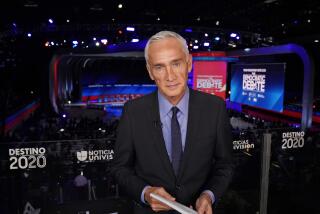Televisa Could Battle Its U.S. Partner
- Share via
Mexican entertainment giant Grupo Televisa signaled Wednesday that it wasn’t ready to play nice with the group of private investors that last week won the auction for Spanish-language media company Univision Communications Inc.
Televisa, the losing bidder and Univision’s most important supplier of programming, said it wanted to sell its 11.4% stake in the Century City-based broadcaster “as soon as possible” and threatened to become a competitor instead of a partner in the U.S.
The plan, outlined in a filing with the Securities and Exchange Commission, could mean that the budding relationship between Televisa and Univision’s prospective buyers might be fraught with as much drama and contention as Televisa’s long-running partnership with Univision Chairman A. Jerrold Perenchio.
The private investors who won the auction had sought to bury the hatchet and forge a good working relationship with the producer of the wildly popular telenovelas that drive Univision’s stellar ratings.
Last week, as part of its $12.3-billion winning bid, the group, which includes Los Angeles billionaire Haim Saban, offered Televisa the opportunity to join its team and even increase its ownership interest in Univision to 19.9%.
But Televisa said no.
Instead, the Mexican company said it wanted to sell its current interest before the sale of the company is complete, and pursue “new business opportunities in the growing U.S. Hispanic marketplace.”
“Televisa is prepared to discuss with you a sale of its shares of Univision as soon as possible,” Executive Vice President Alfonso de Angoitia wrote in a terse letter to the consortium, which was included in the filing. He indicated that Televisa would sell its holdings for $36.25 a share -- the price the investor group had offered to pay the remaining Univision shareholders.
Some analysts interpreted Televisa’s salvo as a gambit to gain leverage in its dealings with the consortium of private investors made up of Providence Equity Partners, Madison Dearborn Partners, Texas Pacific Group, Thomas H. Lee Partners and Saban.
“Today’s Televisa release could be more ‘banter’ in this long telenovela,” Bank of America analyst Jonathan A. Jacoby wrote in a research note. “This could be posturing.”
A spokesman for Providence Equity, the lead firm, declined to comment, as did a representative of Univision and Saban.
In its regulatory filing, Televisa said that selling its Univision shares would free it from a 1996 “participation agreement” with Perenchio that restricted the Mexican company from launching businesses in the U.S. that would compete with Univision. However, a source familiar with the agreement said that that contract would expire automatically upon the completion of the sale of Univision, which is expected early next year.
Even then, however, Televisa might be unable to launch a Spanish-language rival to Univision using its own programming. Another, more binding agreement requires Televisa to offer its Spanish-language shows exclusively to Univision through 2017. That deal was struck in 1992 when Perenchio teamed up with Televisa’s then Chairman Emilio Azcarraga Milmo and Venezuela’s Gustavo Cisneros to buy Univision from Hallmark Cards Inc. for $550 million.
That pact, called the programming license agreement, has long been the source of much of the friction between Televisa and Univision.
Televisa has long believed that the iron-clad agreement takes advantage of Televisa by not recognizing the true value of its popular programming. Televisa receives royalty payments of 9% of Univision’s advertising revenue. However, its programming brings in about 40% of that revenue.
Some analysts speculated that Televisa might be threatening to start new businesses as a way to negotiate a substantial increase in its royalty payments with the winning bidder.
Televisa lost last week’s bidding when Perenchio accepted the Saban group’s offer of $36.25 a share, without inviting Televisa and its bidding partners to submit a revised bid after offering $35.75 a share.
Univision values the winning bid at $13.7 billion because it also includes the assumption of $1.4 billion in debt.
Univision has said that Televisa could still offer a higher bid for Univision as long as it pays a $300-million “break-up” fee.
Analysts say that Televisa is unlikely to muster a higher bid. Two weeks ago, Televisa lost three private equity partners that had been expected to join its bid. Televisa’s efforts were hobbled by a U.S. law that prevents foreign citizens from owning more than 25% of a U.S. broadcasting company.
Bank of America’s Jacoby said the end of the 1996 participation agreement might offer Televisa some benefits, including the ability to buy a minority interest in U.S. television stations or begin producing English-language shows to sell to U.S.-based networks. Networks this year have shown an increased interest in the telenovela format.
“The 1996 agreement basically governs new distribution initiatives,” Jacoby wrote. He added that Televisa could not use the programming supplied to Univision as part of any new venture. Instead, the participation agreement stated that Perenchio, Televisa and Cisneros’ Venevision “would be required to offer Univision a 50% economic interest in any new U.S. distribution initiative the parties wanted to undertake.”
Four years ago, Televisa and Univision teamed up for such an initiative, launching TuTV, a digital broadcast in the U.S. of five of Televisa’s pay channels in Latin America, including Spanish-language films and music videos.
More to Read
The biggest entertainment stories
Get our big stories about Hollywood, film, television, music, arts, culture and more right in your inbox as soon as they publish.
You may occasionally receive promotional content from the Los Angeles Times.











